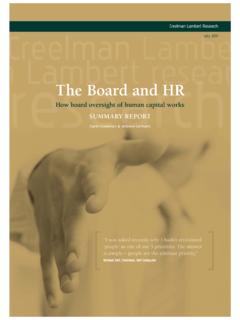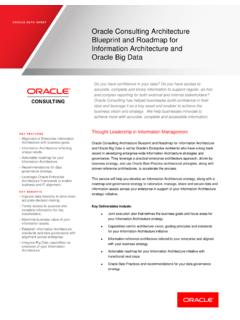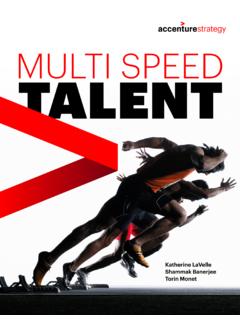Transcription of Ron Heifetz: Adaptive Leadership - Creelman …
1 2009 Ron Heifetz: Adaptive Leadership We ve all read so much on Leadership that it s rare for a book to teach us a whole new way of seeing the challenges. But if you haven t read Harvard professor Ron Heifetz s work then his new book The Practice of Adaptive Challenge (co-authored by Alexander Grashow and Marty Linsky) is a must read. In fact, even for those familiar with Heifetz s work I think it s a must read the lessons are worthy of contemplation. I recently spoke to Dr. Heifetz about Adaptive Leadership . DC: Usually when we talk about Leadership we are talking about day-to-day practices, but as I understand it, what you call Adaptive Leadership isn t needed in all situations. RH: When you are operating in an Adaptive context, then Adaptive Leadership is an everyday art form. But at any particular point in time many of us are not operating in an Adaptive context.
2 There are many areas of managerial and professional life where you can do exceedingly good work within the repertoire of your know-how and within the procedures and cultural design of your organization. Those contexts do not require Adaptive Leadership ; they require the appropriate practices of managerial authority and expertise. DC: How do we distinguish between Adaptive contexts and more routine situations? RF: The Adaptive context is a situation that demands a response outside your current toolkit or repertoire; it consists of a gap between aspirations and operational capacity that cannot be closed by the expertise and procedures currently in place. For example, I ve worked with IBM and they have beautifully designed processes that operate across product development lines, geographies and industries of course they require ongoing improvements, but the capacity to generate those improvements is already built into the current processes and expertise.
3 For a whole host of profit making initiative these existing processes work extremely well. But when we take something very new and different like cloud computing (where computing is spread out over a variety of resources across the internet) then that may require a whole new way of doing business. In an area like this the opportunities are ill-defined and discovering those opportunities will require significant changes in the way people do business in many different places in the company. This sort of thing is an Adaptive challenge. An example of failing to succeed in an Adaptive context can be seen in Sony. Their engineers came up with the equivalent of an iPod before Apple but ran into obstacles within the company. Sony s organization was beautifully designed to come up with improvements to the next generation of portable CD players, walkman and discman, but this same beautifully designed organization didn t succeed in the Adaptive challenge of adopting a new technology.
4 This new technology was a threat to many of the ways they had organized themselves and thought about their product line including the big investment they made in buying CBS Records. The engineering itself was not a big Adaptive challenge but reshaping the company strategy, organization, and mindset was. Imagine a manager telling the people who had been working very, very hard on a portable CD player or integrating vertically with CBS Records that they were throwing significant parts of that away to try something new. That sort of work is difficult and painful. It was resisted and so they lost the huge opportunity that Apple seized. DC: If I think I m facing an Adaptive challenge how do I approach it? RH: One moves between high levels of abstraction and low levels of concrete action to discover where people start disagreeing. For example people might agree at the highest level of abstraction that the company is supposed to thrive in changing conditions, so you start there and descend to where they start disagreeing about strategy and tactics.
5 Next you identify the parties who have a stake in that situation and bring the tough questions to the centre of their attention. You might say Here are the trends we don t know how to address or Here is a space where we really haven t defined our approach ; that gives everyone a chance to put forward their perspective. The job of Leadership is to orchestrate the conflict that arises in those discussions and develop experiments to find out how to push the frontier forward in an evolutionary way. DC: So, Leadership is not just knocking heads together to get people to agree, nor making their own decision on what should be done. RH: People in positions of authority often move to find premature closure. But in an Adaptive challenge they should take an experimental approach where the job of authority is to raise the tough questions and establish the processes that hold people s feet to the fire of being creative, making mistakes and learning from mistakes.
6 This is quite different from the more common view that people in authority know what they are doing or, if they don t know what they are doing they shouldn t be in the job. In an Adaptive challenge leaders don t know what they are doing because it s a frontier where everyone is in over their heads. For example, to expect President Obama to know how to fix the economy just because he has some smart people around him is na ve, yet that is the dominant expectation. There is a significant chance that we are operating in an economic environment that is not amendable to our current tool kit. We can apply our tool kit to stabilize the situation but the underlying challenges to how we do business will require a much longer term series of adaptations. We need hundreds of micro-experiments and adaptations all across the country; none of that can be orchestrated by expertise or commands from the President.
7 So the notion that Leadership means I know where we are going just follow me ; or I ll bring in the best experts and then follow me is clearly inappropriate to Adaptive contexts and puts enormous pressure on people in authority to fake it and provide quick technical fixes that tend to avoid the more significant questions. DC: If you enthusiastically tackle an Adaptive challenge in your organization what are the risks? RF: You risk being neutralized in a whole variety of ways. The dangers take on many forms, from physical assassination in the case of public leaders, to more subtle attacks, to marginalization. People are often diverted from championing Adaptive work by being intentionally reassigned. There is also the risk of seduction of the sort: We really like you and applaud your work. You ve got a great you stop asking these tough questions.
8 There are all kinds of ways people are neutralized when they try to raise the tough questions. DC: What can you do about these dangers? RF: In the practice of Leadership you need to be able to read the signs of danger and take actions to protect your own capacity to act, which means keeping your job and your reputation. You need to be drawing on allies and confidants. You need to step back from your own involvement from time to time and take a measure of what is going on we call this getting on the balcony as opposed to being on the dance floor . You need to identify hidden stakeholder groups that would sabotage the process if they are not smoked out and brought into the process. A leader needs to cultivate ways of listening to people both musically and analytically, so you can hear the songs beneath the words and detect the underlying values, loyalties and interests that are at stake and being protected.
9 It s also necessary to seek ways to maintain your own sense of compassion and to recognize that by facing Adaptive challenges you are stepping on people s needs. You must avoid falling into the temptation of arrogant enthusiasm where you discount the opposition because you feel they are boneheaded for resisting change. This is not a very effective way to engage them in entertaining your point of view. DC: Let s stick on that point a moment. Many people, especially young people, get into situations where they see a change is absolutely necessary and then are appalled by the opposition to their ideas. They think what a bunch of jerks. What s your response to that opinion? RF: It s a misdiagnosis. Yes, it is a natural reaction to feeling neutralized or ignored, but people are rarely completely jerks. People are perceived to be jerks when they are frustrating your own aspirations.
10 One has to diagnose why they are frustrating your hopes; usually they are protecting the interests of people that your point of view is threatening. Your job is to look through them and see the constituency behind them that they are representing. Ask yourself Who would that person be disappointing if they took my point of view seriously? DC: Adaptive challenges appear daunting. RF: Leaders need to accept that Adaptive contexts are not simply win-win games. A lot of the organization s DNA can be conserved but some will need to be discarded. It s a painful process. Organizations often fail to overcome Adaptive challenges and leader s careers can often come undone trying to push change. But because there are ways of engaging people so that they tolerate and accept losses on behalf of thriving in a changing world we can be positive in facing Adaptive contexts.







